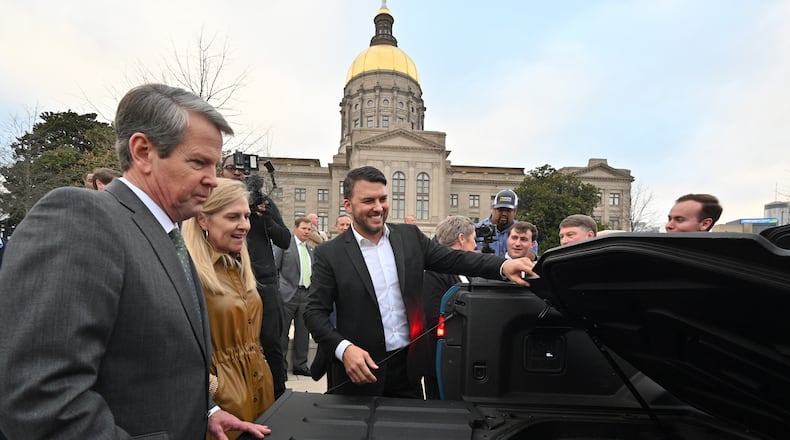Editor’s note: This article has been updated throughout with additional details.
Electric vehicle maker Rivian on Thursday confirmed it plans to build a $5 billion assembly plant and battery factory in Georgia, which Gov. Brian Kemp called “the largest single economic development project ever in this state’s history.”
At a press conference with Kemp at the State Capitol, a Rivian executive outlined plans to employ 7,500 workers at its factory, a jobs tally state officials have said could grow to 10,000. The plant will be built on a sprawling swath of farmland and pine forest about an hour’s drive east of Atlanta.
Rivian plans to begin production in 2024 at the Georgia plant, where it expects to be able to manufacture up to 400,000 vehicles a year. Construction is slated to begin next summer.
Georgia beat out Texas and several other states for the vehicle factory, Georgia’s first since Kia announced plans to build a manufacturing center in West Point near the Alabama border. Rivian said the new factory will assemble its R1T truck and R1S SUV, in addition to delivery vans for Amazon, a major investor in Rivian.
Rivian has been in talks for months to develop the East Atlanta Megasite along I-20. The site straddles Walton and Morgan counties, between the small communities of Social Circle and Rutledge. The land will become a northern extension of Stanton Springs, a giant industrial complex that includes a Takeda therapeutics factory and a Facebook data center.
State officials cited the state’s focus on the EV industry, advanced manufacturing workforce, interstate and rail network and Hartsfield-Jackson International Airport among the factors behind choosing Georgia.
“We’ve all been preparing for a company and a project like Rivian for a very long time,” Kemp said. “The fact is we did not get here by accident. We knew Georgia could land a project like Rivian. We just needed to find the right fit.”
Rivian said it evaluated ”a variety of sites across the country, looking for the right partner and combination of sustainable business operations, talent pool and proximity to supply chain and logistics.”
Officials did not outline compensation for jobs at the future factory, but Rivian Chief People Officer Helen Russell said the company offers competitive pay and benefits and stock. “Every employee at Rivian owns a piece of the business,” she said.
Auto factories are among the most coveted economic development projects. They bring billions in investment, thousands of jobs on site and the likelihood of spinoff jobs from a network of suppliers. The Rivian plant comes with added cachet — a cutting-edge assembly center for EVs, which many believe are the future of the auto industry.
Credit: HYOSUB SHIN / AJC
Credit: HYOSUB SHIN / AJC
EVs make up just 2% of U.S. auto sales today but are expected to grow exponentially amid tightening fuel standards, lower costs of production and consumer shifts to more environmentally friendly transportation.
Irvine, California-based Rivian went public in November, and Wall Street values the company at nearly $100 billion, believing the Tesla rival can own a significant piece of the EV future.
Despite Rivian’s stock market capitalization topping automotive giants Ford and GM, it is still very much a startup. It said Thursday it has delivered only 386 vehicles to date and plans to deliver its first vans to Amazon this month. Rivian currently has one plant, located in Illinois.
It’s not immediately known what state and local incentives were used to entice Rivian, but the number is likely to be staggering. The Fort Worth City Council approved a $440 million tax incentive package this year to lure the plant to North Texas, according to The Dallas Morning News. That sum didn’t include offerings from the state of Texas.
In 2018, when Georgia landed the SK Battery America plant, which counts Ford and Volkswagen among its EV battery clients, state and local officials offered the South Korean company about $300 million in tax breaks, grants, free land and worker training. Rivian’s expected investment is twice as large as the $2.6 billion SK project.
Pat Wilson, the state’s economic development commissioner, said the Rivian package will resemble the one offered Kia 15 years ago, which totaled more than $400 million. Like with Kia, Wilson said the state will also provide a workforce training center.
Critics say automakers often pit states against one another in expensive bidding wars for plants when factors like workforce and supply chain play far bigger roles in a company’s decision-making.
The Atlanta Journal-Constitution first reported Georgia’s pursuit of Rivian in July. In November, the AJC first reported Rivian was in late-stage negotiations for a site east of Atlanta while simultaneously in discussions with other states. And last week, the AJC first reported that the formal announcement of a Rivian plant would come this week.
The Rivian announcement is likely to provide a jolt to Kemp, facing a difficult reelection next year. Former U.S. Sen. David Perdue announced a Republican primary challenge, and if Kemp survives that bruising contest, a potential rematch with 2018 rival Stacey Abrams awaits.
Thursday’s celebration elicited bipartisan praise. Democrats see Rivian as the vanguard of a cleaner electric mobility future. President Joe Biden’s legislative agenda calls for billions of federal dollars to build charging networks and support EV development.
“My vision is that Georgia should lead the nation in renewable energy, and today’s announcement is a huge step forward,” said U.S. Sen. Jon Ossoff, D-Georgia. “I thank our state’s leaders for working collaboratively to attract this investment.’'
Georgia Republicans, however, note a provision in the Democrats’ proposed Build Back Better legislation would give buyers an enhanced federal tax credit if they purchase an EV from a U.S. factory with a unionized workforce, such as GM and Ford.
Georgia has a low unionization rate, and many observers have assumed Rivian’s workforce here likely would be non-union. Still, Rivian likely will be a tantalizing target for labor organizers and unions could factor into construction work.
Rivian founder and CEO ″RJ (Scaringe) is going to work with Georgians,” said Kenny Mullins, the principal officer for IBEW 613. “I believe this facility will be built by union members. This is going to be good for Georgians.”
Credit: Hyosub Shin/AJC
Credit: Hyosub Shin/AJC
‘The jury is still out’
Rivian was founded about a dozen years ago and spent years in development. The R1T pickup recently was named the MotorTrend Truck of the Year, the first time the prize has ever been awarded to an EV.
Amazon, one of its large investors, has a deal to acquire 100,000 Rivian delivery vans by 2030.
Rivian said Thursday it has received a total of 71,000 orders in the U.S. and Canada for its pickup truck and SUV through Dec. 15. It has said its goal is to produce 1 million EVs globally a year by the end of this decade.
Rivian’s other early investors include T. Rowe Price and Ford Motor.
Cox Enterprises, owner of the AJC, owns a 4.7% stake in Rivian and supplies services to Rivian. Sandy Schwartz, a Cox executive who oversees the AJC, is on Rivian’s board of directors and holds stock personally. He does not take part in the AJC’s coverage of Rivian.
Rivian might be well-financed and valued highly by Wall Street, but the company faces several challenges to meet its goals.
The company first must deliver quality vehicles, build its capacity to service the vehicles it sells and fend off EV competition from rivals such as Tesla, GM, Ford and Volkswagen, said John C. Taylor, a professor of supply chain management at Wayne State University in Michigan.
“Whether Rivian will get a significant share of (the future EV market), the jury is still out,” Taylor said.
Rivian on Thursday reported its net loss widened to $1.23 billion in the third quarter from a $288 million loss in the same period a year ago. It cited higher expenses for product research and development, hiring sales staff, adding new office locations and a loss tied to some promissory notes.
Georgia has pursued car factories with vigor for decades, landing Kia in 2006, but missing out on several others.
The West Point area was struggling, bludgeoned by the loss of textile jobs, when Kia made its announcement. But Kia’s investment helped rejuvenate the area, bringing not only the 2,700 jobs from Kia, but thousands more from suppliers dotting the state.
On Thursday, local leaders around the future factory in Walton and Morgan counties took a victory lap with Rivian.
Jerry Silvio, the chairman of the Joint Development Authority (JDA) of Jasper, Morgan, Newton & Walton Counties, the government entity that helped develop Stanton Springs, said Rivian’s “commitment to the community and environment is in alignment with our goals at the JDA.”
Local officials have spent years putting together the East Atlanta Megasite land east of Atlanta to attract a major manufacturer. A joint development authority in the four-county area has been in negotiations to acquire additional farmland.
In recent interviews, some who live in the Rutledge area said they were excited by the prospect of thousands of new jobs. Many others feared a factory could upend rural life, negatively impact the environment and strain communities without the infrastructure to handle such an automotive boom.
The Rev. Alan Jenkins, who plans an organic farm on family land near the site, said he and others will hold the company to the highest standards.
“If Rivian does come, we will welcome our new neighbors with a fervent desire to protect the watershed from chemicals and run-off,” he said. “May we work together protecting the stars at night from light pollution, addressing traffic and noise mitigation. May we work together to honor the land of past, present and future generations.”
Keep Reading
The Latest
Featured







